Related Research Articles
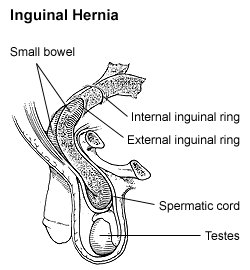
A hernia is the abnormal exit of tissue or an organ, such as the bowel, through the wall of the cavity in which it normally resides. Various types of hernias can occur, most commonly involving the abdomen, and specifically the groin. Groin hernias are most commonly of the inguinal type but may also be femoral. Other types of hernias include hiatus, incisional, and umbilical hernias. Symptoms are present in about 66% of people with groin hernias. This may include pain or discomfort in the lower abdomen, especially with coughing, exercise, or urinating or defecating. Often, it gets worse throughout the day and improves when lying down. A bulge may appear at the site of hernia, that becomes larger when bending down. Groin hernias occur more often on the right than left side. The main concern is bowel strangulation, where the blood supply to part of the bowel is blocked. This usually produces severe pain and tenderness in the area. Hiatus, or hiatal hernias often result in heartburn but may also cause chest pain or pain while eating.

An appendectomy, also termed appendicectomy, is a surgical operation in which the vermiform appendix is removed. Appendectomy is normally performed as an urgent or emergency procedure to treat complicated acute appendicitis.
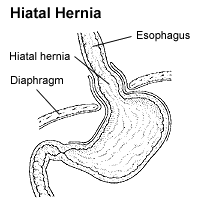
A hiatal hernia or hiatus hernia is a type of hernia in which abdominal organs slip through the diaphragm into the middle compartment of the chest. This may result in gastroesophageal reflux disease (GERD) or laryngopharyngeal reflux (LPR) with symptoms such as a taste of acid in the back of the mouth or heartburn. Other symptoms may include trouble swallowing and chest pains. Complications may include iron deficiency anemia, volvulus, or bowel obstruction.
The year 1880 in science and technology included many events, some of which are listed here.
The year 1877 in science and technology involved some significant events, listed below.

An inguinal hernia is a hernia (protrusion) of abdominal-cavity contents through the inguinal canal. Symptoms, which may include pain or discomfort especially with or following coughing, exercise, or bowel movements, are absent in about a third of patients. Symptoms often get worse throughout the day and improve when lying down. A bulging area may occur that becomes larger when bearing down. Inguinal hernias occur more often on the right than left side. The main concern is strangulation, where the blood supply to part of the intestine is blocked. This usually produces severe pain and tenderness of the area.

Sir William Macewen, was a Scottish surgeon. He was a pioneer in modern brain surgery, considered the father of neurosurgery and contributed to the development of bone graft surgery, the surgical treatment of hernia and of pneumonectomy.
Macewen's sign or Macewen sign is a sign used to help to diagnose hydrocephalus and brain abscesses. Tapping (percussion) the skull near the junction of the frontal, temporal, and parietal bones will produce cracked pot sound. Positive test is indication of separated sutures. This is due to raised intracranial tension.
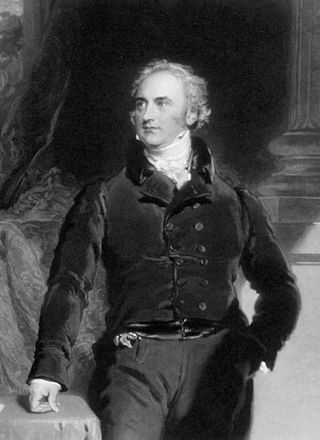
Sir Astley Paston Cooper, 1st Baronet was a British surgeon and anatomist, who made contributions to otology, vascular surgery, the anatomy and pathology of the mammary glands and testicles, and the pathology and surgery of hernia.
The study of neurology and neurosurgery dates back to prehistoric times, but the academic disciplines did not begin until the 16th century. From an observational science they developed a systematic way of approaching the nervous system and possible interventions in neurological disease.

Hernia repair refers to a surgical operation for the correction of a hernia—a bulging of internal organs or tissues through the wall that contains it. It can be of two different types: herniorrhaphy; or hernioplasty. This operation may be performed to correct hernias of the abdomen, groin, diaphragm, brain, or at the site of a previous operation. Hernia repair is often performed as an ambulatory procedure.

William Stewart Halsted, M.D. was an American surgeon who emphasized strict aseptic technique during surgical procedures, was an early champion of newly discovered anesthetics, and introduced several new operations, including the radical mastectomy for breast cancer. Along with William Osler, Howard Atwood Kelly and William H. Welch, Halsted was one of the "Big Four" founding professors at the Johns Hopkins Hospital. His operating room at Johns Hopkins Hospital is in Ward G, and was described as a small room where medical discoveries and miracles took place. According to an intern who once worked in Halsted's operating room, Halsted had unique techniques, operated on the patients with great confidence and often had perfect results which astonished the interns.
Athletic pubalgia, also called sports hernia, core injury, hockey hernia, hockey groin, Gilmore's groin, or groin disruption is a medical condition of the pubic joint affecting athletes.
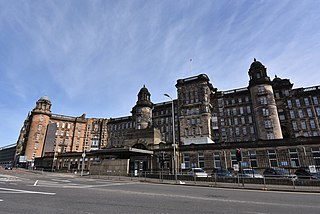
The Glasgow Royal Infirmary (GRI) is a large teaching hospital. With a capacity of around 1,000 beds, the hospital campus covers an area of around 8 hectares, and straddles the Townhead and Dennistoun districts on the north-eastern fringe of the city centre of Glasgow, Scotland. It is managed by NHS Greater Glasgow and Clyde. It was originally opened in 1794, with the present main building dating from 1914.

"Living with a Hernia" is a song by "Weird Al" Yankovic. The song is a parody of "Living in America" by James Brown, from the film Rocky IV. The song mostly describes the terrible "aggravation" and "back pain" that a hernia causes. The narrator himself claims to be suffering from a hernia, and that he's "Got to have an operation".
An incisional hernia is a type of hernia caused by an incompletely-healed surgical wound. Since median incisions in the abdomen are frequent for abdominal exploratory surgery, ventral incisional hernias are often also classified as ventral hernias due to their location. Not all ventral hernias are from incisions, as some may be caused by other trauma or congenital problems.
Coccygectomy is a surgical procedure in which the coccyx or tailbone is removed. It is considered a required treatment for sacrococcygeal teratoma and other germ cell tumors arising from the coccyx. Coccygectomy is the treatment of last resort for coccydynia which has failed to respond to nonsurgical treatment. Non surgical treatments include use of seat cushions, external or internal manipulation and massage of the coccyx and the attached muscles, medications given by local injections under fluoroscopic guidance, and medications by mouth.
The Regius Chair of Surgery at the University of Glasgow was founded in 1815 by King George III, who also established the Chairs of Chemistry and Natural History.
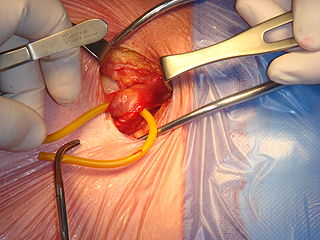
Inguinal hernia surgery is an operation to repair a weakness in the abdominal wall that abnormally allows abdominal contents to slip into a narrow tube called the inguinal canal in the groin region.
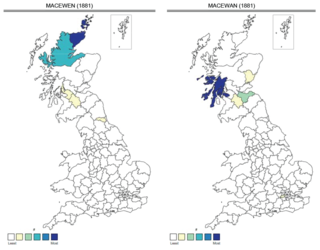
The Scottish surname MacEwen derives from the Old Gaelic Mac Eoghainn, meaning 'the son of Eoghann'. The name is found today in both Scotland and Northern Ireland. Because it was widely used before its spelling was standardised, the modern name has several common variations.
References
- ↑ Alexander Hugh Ferguson (1907). The Technic of modern operations for hernia. Cleveland press. pp. 226–. Retrieved 3 July 2011.
- ↑ Philadelphia County Medical Society (1888). Proceedings. pp. 72–. Retrieved 3 July 2011.
- ↑ Herbert William Allingham (1904). Operative surgery. William Wood & Company. pp. 267–. Retrieved 3 July 2011.